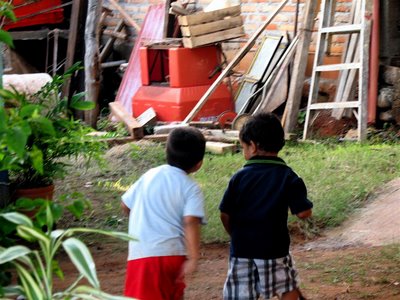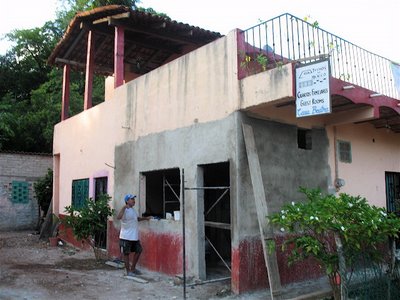The other day, I wrote a post about my struggle to understand how my culturally-based expectations impact my ideas about what is appropriate and polite (in this case, in a small restaurant in Mexico). That post brought a lot of comments and some emails. I didn't post some of them because they struck me as racist and/or arrogant. But the Comments I did publish all gave me food for thought.
It seems odd to me now, but part of my job in my previous life, was overseeing Federally and State funded mental health services. And on small piece setting up methodologies to ensure that the services, inpatient and outpatient, were "culturally competent".
A really lovely new rental building, overlooking the ocean.Looking back, I can see how totally ignorant I was about what that phrase meant. Really, I had no clue. And I still probably have a long ways to go. I had lots of training, and by fluke or choice, I have always had friends who were raised in other cultures. But I still didn't get it. The upside of new construction. Villa Celeste.
The upside of new construction. Villa Celeste.
 The upside of new construction. Villa Celeste.
The upside of new construction. Villa Celeste.It's really only been in the last few months that it's becoming clear to me how deeply our early childhood family/cultural training is embedded in all of us. I am thinking particularly about what behavior is considered polite and appropriate is each culture. I am embarrassed to realize how insensitive I am in lots of ways.
I had always had enough trouble being aware of how my behavior impacted other people when I was living in English. Let alone in Mexico and in Spanish. I guess one of the good things about not speaking or understanding Spanish, beyond the basics, is that I have to watch people's expressions and body language much more carefully than I ever did before. And I am still not good at it. But I do know now that if you are not paying attention to the whole message (words, eyes, body movements, expressions) you aren't going to get the message. And if you are sure your experience of the world is THE true experience, you will never get the message, except from other people just like you. Two little primos, cousins, hanging out together
Two little primos, cousins, hanging out together
 Two little primos, cousins, hanging out together
Two little primos, cousins, hanging out together as their Dad's, Granddad, and Uncles, work on building project.
And, if, in addition, you assume that everyone is experiencing a particular social setting (like a restaurant) with the same expections and values are you have, well, Good Luck!!! I think one of the harder things in the world is to be able step back from your own filter of expectations about politeness and behavior, and values. And become aware of other people's usually unspoken and rarely conscious, expectations about behavior.For example, just because your experience in restaurants in the U.S. is that they MUST, by law, serve you, well, it's just not reality in Mexico. And the lovely saying that "the customer is always right" is certainly not true here. And maybe that's a good thing. Why should anyone with any pride or feeling of self-worth allow a customer to treat them with rudeness or disrepect? And the gringo attitude that the most important this is making money just don't wash for many people in Mexican. At least that's my observation.
Many businesses in Mexico are very small, family-run, businesses, where the family eats, sleeps, bathes, washes their clothes, does their homework, and raises the children. And entertains their friends and socializes. Entering a small family business is very much like entering someone's home.
They have no obligation to serve you. It might be a good idea to serve you, if they want to make money. But that's not necessarily a cultural priority here. Family and personal pride seem to be valued much more than making money, at least in the older generations in Mexico.
It's my observation that almost every interaction in small town Mexico is personal. The business part comes later. It seems though it is disrepectful to treat a business person in Mexico as if that's all they are: a piece of a business. First, there's saying "Buenas dias", and acknowledging each other, and maybe making some small talk, and establishing a personal connection. Then comes the business. Beatriz's husband, Gabi, is walling off a small patio
Beatriz's husband, Gabi, is walling off a small patio
 Beatriz's husband, Gabi, is walling off a small patio
Beatriz's husband, Gabi, is walling off a small patio to make an additional, very small, rental room with bath.
Of course, this is just my take on one tiny aspect of what it means to be aware of how your own culture has biased and limited your ideas about how to treat other people. I may be really off base here. But my own opinion is that many of the people running small restaurants and other small businesses put their family first in a real way.
The somewhat derrogatory phrase "Mexican Time" refers to that value. Many people in Mexico are able to sort their priorities about what is most important in their lives, and what needs to be done first, in accordance with those values. And often what important is not someone's wanting their new tile for their bathroom delivered, RIGHT NOW!!! Or whatever. Bouganvilleas grow all over Chacala.
Bouganvilleas grow all over Chacala.
This color is partly an artifact of digital photography,  Bouganvilleas grow all over Chacala.
Bouganvilleas grow all over Chacala. and partly real.
2 comments:
Another fascinating post.
I have an M.A. in International Relations. One of my favorite classes was Intercultural Communications. Nevertheless, even though I am aware that there are substantive differences in cultural behavior and am familiar with cultural norms in several countries, as you observed yesterday: sometimes the clues are so subtle as to be invisible to the uninitiated. The cultural imprint that you grew up with is necessarily the filter through which you analyze and interpret the world. Additional insight comes through observation and trial & error, but while some people are able to pick up cultural clues and adapt to them, others are not.
I recall a post where you were visiting San Miguel and felt snubbed because one of the gringos who lives there did not say good morning to you. You have adapted to the custom of greetings and their importance in the Mexican culture. Perhaps that man had not. But more importantly, and I am assuming here that the man was an American, it is not the American habit to greet strangers on the street. So you were operating under your newly-acquired Mexican cultural imprint for greetings, and he may have been operating under his original American imprint not to greet another gringo whom he doesn’t know.
It seems to me that you have rapidly developed a keen understanding of and insight into Mexican cultural behavior since moving there. Your statements about the danger of assuming other people’s expectations and values under the same circumstances to be the same as your own and the difficulty in letting go of your own cultural imprint to become fully aware of another is proof of that. You are absolutely right that language is only one piece of the puzzle.
It’s a fascinating subject, and I look forward to your sharing more cultural insights in the future.
Bound for Ceiba, yes, that is pretty much the normal way business is conducted in Latin America. They want to get to know you first. Relationships are everything. Business comes third, after relationships and family.
So you know a little about us: We are gringos who have lived in Las Vegas, NV for 18+ years... this last year we relocated to rural Colorado and we spend a fair amount of time in Puerto Vallarta.
I have found that PV is more tolerant of our gringo behavior, whereas smaller communities (this trip it was Punta Perla) are not so much so... my husband tends to get hungry during siesta time and this poses a problem if you assume the lady who is preparing for her dinner rush is going to stop her prep work and own lunch time in order to cook you a fish simply because you didn't eat earlier! He didn't even notice her body language (he is normally a nice guy) but wasn't even looking for it because she agreed to make him some supper. Silly husband!
I do not feel that this is simply an issue of Mexican time and priorities... because I find the exact same things are true in rural America. People who live in these areas appreciate (and expect) that you will abide by the rules of greeting someone when you pass them on the sidewalk or the road... that you will take the time to talk to them a bit before you start headlong into "business"... and that you will understand when ALL the businesses close tonight for the homecoming football game.
People think that you have to be born in an area to feel acceptance... I feel like you need to ACT like you were born there and learn to adapt to how things are done in your new surroundings (including NOT making eye contact with your neighbors in a big city)! :p
Kim
Post a Comment